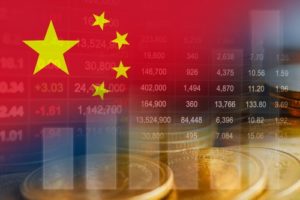
Emily and I met one of our fund managers who is usually wary about investing in China. He thinks the risk of government intervention is too high. This time he told us he dipped his toe in the water. He found a Chinese loo roll manufacturer, and believes that even the Chinese government probably doesn’t care what you wipe your bottom with and will leave him alone.
They interfere with almost everything else of course, and here we are again. China has repeatedly tried to stimulate its equity market over the years. But what is the real root cause of the problem?
Since 2008, China has created a very large financial bubble for itself. It has a 5% GDP growth target, which they achieve by investing, largely in infrastructure, whether they need it or not. Capital spending is nearly 45% of GDP. In the UK for example the equivalent number is about 17% or so, having fallen from a peak of around 26% in the late 1980s. In the EU and the US it is just over 20%.
The UK lags noticeably and that 17% is one of the numbers Rachel Reeves is staring at pretty hard for the upcoming budget. A key challenge for the government is they would like to increase this number but need to find the money first. Where does China get the money? Can we just copy them? Well, they have taken debt from around 140% of GDP pre-2008 to around 300% now, so no.
However China’s return on this investment is currently just over 0.1%. EPS growth in the Chinese stock market last year was negative. None of the GDP growth shows up in the equity market which despite the recent rally and multiple stimulus attempts, is less than half its pre-2008 peak.
Chinese banking assets are 6 times bigger than in 2008. In money terms this is about $50trn. In the UK the equivalent number is about flat, the EU has fallen slightly while the US is up about 70% or so.
You have probably heard about the property crisis in China. Over 60% of consumer wealth in China is in property vs 51% in the UK, despite our historically high house prices. Probably Chinese banks are struggling? Not according to themselves. Chinese banks are currently reporting less than 0.7% of their loans as non-performing which is almost half where they were in 2021 (1.2%). The property crisis appears to have improved their credit quality, which would be unusual if it were true.
Where did the property crisis come from? China manages its currency in a “managed float” against a basket of countries it trades with including most obviously the US. This is one reason Donald Trump is especially willing and able to mess with them through tariffs and generally making a nuisance of himself, even when he is not actually the president.
In simple terms it means China imports monetary problems from the US. For example when the US is raising rates it weakens the renminbi, unless China also raises its rates. In the wake of Covid, China was an outlier with inflation around 0%, and so they were not able to raise rates and their currency fell 15% vs the dollar in 2022 and 2023.
0% inflation gives China high real yields. As real yields rise, this puts pressure on anything with leverage or duration, which includes both equities (usually) and property (almost always). It is not a coincidence that the stimulus was announced after the US started to cut rates.
But there is more to Chinese equities than just the recent stimulus.
Japan’s corporate reform story is now very well known, but China has one as well. China has a large State Owned Enterprise (SOE) sector. As the name suggests the government is the biggest shareholder in these.
Like Japan, China has an ageing population. I don’t know if this means China will follow a similar economic path, but it does mean that they have similar incentives to improve corporate returns, which they are both trying to do.
Chinese SOEs now have KPIs for return on capital, as well as improving profit metrics. Some SOEs currently yield over 6%, and companies are able to borrow money at 2.25% to buy shares back – well below benchmark lending rates, which are over 3%.
I feel these more deep seated corporate reforms – if successful – are a more compelling reason to buy China here than endless stimulus attempts which do not address the real issues and have not had a lasting impact historically.
Robert Fullerton – Senior Research Analyst

FPC240
All charts and data sourced from FactSet
Hawksmoor Investment Management Limited is authorised and regulated by the Financial Conduct Authority (www.fca.org.uk) with its registered office at 2nd Floor Stratus House, Emperor Way, Exeter Business Park, Exeter, Devon EX1 3QS. This document does not constitute an offer or invitation to any person in respect of the securities or funds described, nor should its content be interpreted as investment or tax advice for which you should consult your independent financial adviser and or accountant. The information and opinions it contains have been compiled or arrived at from sources believed to be reliable at the time and are given in good faith, but no representation is made as to their accuracy, completeness or correctness. The editorial content is the personal opinion of Robert Fullerton, Senior Research Analyst. Other opinions expressed in this document, whether in general or both on the performance of individual securities and in a wider economic context, represent the views of Hawksmoor at the time of preparation and may be subject to change. Past performance is not a guide to future performance. The value of an investment and any income from it can fall as well as rise as a result of market and currency fluctuations. You may not get back the amount you originally invested. Currency exchange rates may affect the value of investments.
